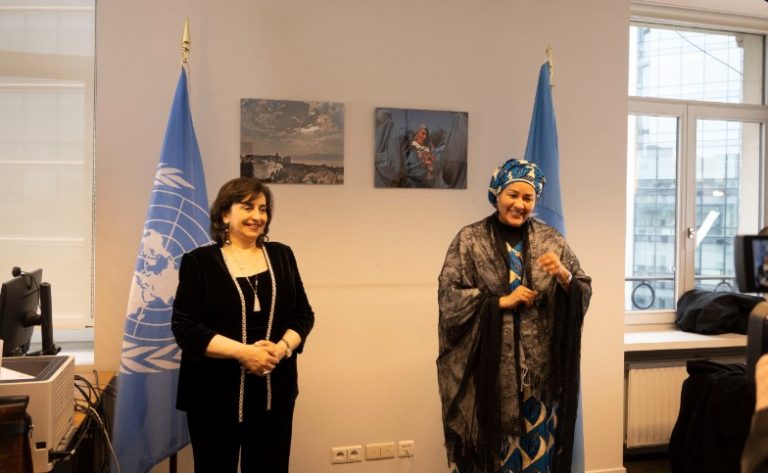
The United Nations Deputy Secretary-General says she opposes cutting aid to Afghanistan as a response to the Taliban’s policies towards women and girls.
Amina Mohammed, the UN deputy chief, and Sima Bahous the head of UN Women, briefed senior EU officials in Brussels earlier this week, after their four-day mission in Afghanistan to engage with Taliban leaders, the country’s de facto authorities, and underscore UN solidarity with the Afghan people.
Standing up for the rights of women and girls
While in Brussels, two of the most senior female UN officials met with a group of European journalists organised by UNRIC, the UN Regional Information Centre for Western Europe.
“I believe that a decision to stop support for humanitarian aid would not be the right one, because millions would suffer and our job is to stand and deliver for women and girls in Afghanistan. I would not have the Taliban succeed and put them in a worse position than they are today. This would mean lives lost,” Ms Mohammed said.
In meetings with the de facto authorities in Afghanistan, the UN delegation directly conveyed the alarm over the recent decree banning women from working for non-governmental organisations, which followed edicts to close universities and secondary schools to female students. Women and girls have also been banned from most public places and most areas of the workforce, in addition to having their movements restricted.
After many aid agencies had to suspend operations, Taliban rulers did announce some exemptions to the ban on women’s work for NGOs, that would allow women health workers to go about their lifesaving work.
“Remember that since they came they have never reversed an edict. They have made exceptions and sometimes exemptions have watered down their edicts. We hope we will have so many exemptions that it neutralises them, that we go back to women and girls in education and in the workplace,” the UN deputy chief said.
“We have to tread a very fine line on holding on to the principles and pushing as far as we can to get the exemptions, which we have done for women, holding the line that we will not replace any women with men. But that doesn’t mean we stopped delivering services in Afghanistan and I would counsel against that,” Ms Mohammed added.

Essential services affected
Sima Bahous, the Executive Director of UN Women, pointed out that delivering services without female staff was quite difficult.
“It is not easy to deliver now because 93% of the staff of the NGOs that will be delivering services to women and girls and communities are women. If they are not allowed to work, not allowed to deliver services, two things will happen: one, services will not reach women; and second, services will not reach families in general,” Ms Bahous said.
The United Nations and its partners, including national and international non-governmental organizations, are helping more than 25 million Afghans who depend on humanitarian aid to survive.
The Deputy Secretary-General insisted lives were at stake.
“There is a reality that is not very pleasant and then we have another reality, which is about women and children, who are going to die, if we don’t take those services to them. There are minus 20 degree temperatures; there are people who really don’t know where to get the next meal from; and many problems for female-headed households . One life lost is too many, and we have to figure out how to get more muscle from the international community, in unity with the region, to push for some of these issues to be reversed by the Taliban.”
International conference on women and girls
Ms Mohammed announced plans for a UN conference on women and girls in the Muslim world in March 2023 in cooperation with UN Women and the Organization of Islamic Cooperation (OIC).
“We are hoping to have an international conference to see what we can do for better understanding of what in fact, Islam is about and how it does uphold the rights of women in education and in the workplace, and then tackle a few of those issues.”
The visit to Afghanistan followed a series of high-level consultations on Afghanistan across the Gulf and Asia. The delegation met with the leadership of the OIC, groups of Afghan women in Ankara and Islamabad, and a group of Ambassadors and Special Envoys to Afghanistan, based in Doha.
Additional link(s):